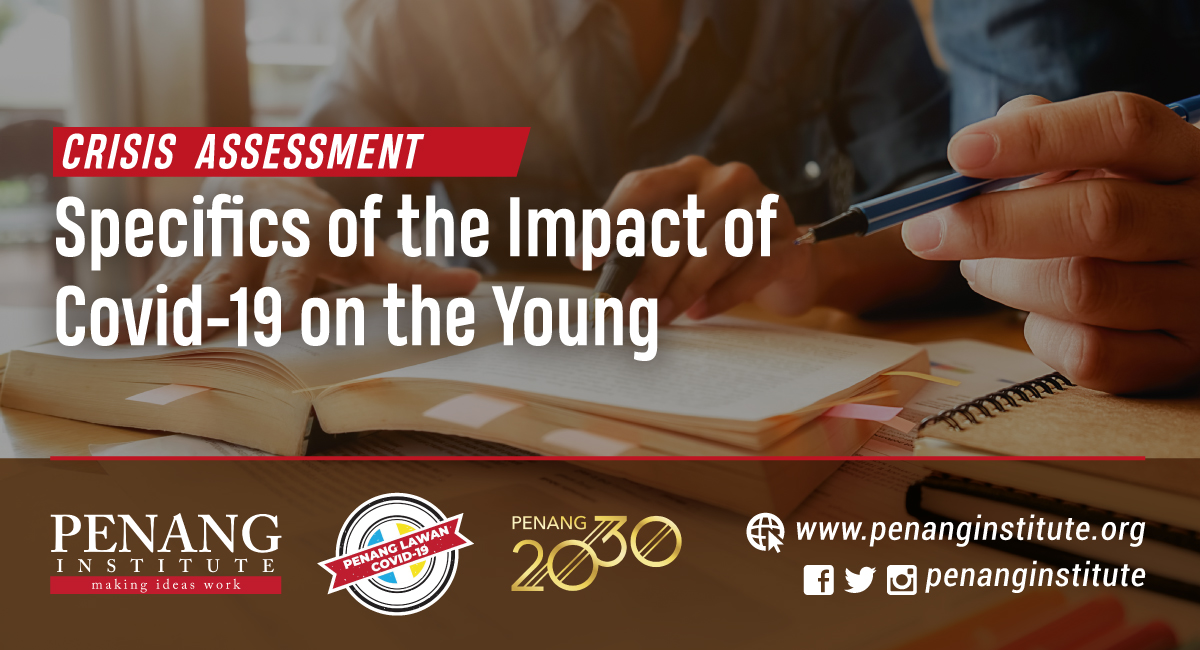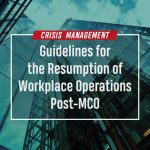EXECUTIVE SUMMARY
- Covid-19 and the prolonged disruption of school life will put more students at risk of dropping out of school later. Some of them may also consider delaying or not pursuing tertiary education at all.
- The mental health specifically of young people is another area of concern. Prolonged disruption of school schedules and the lack of healthy social interaction with their peers could increase whatever pre-existing stress they may have.
- The Education Ministry should consider allowing some form of hybrid learning for students who have great psychological need for physical space to do their schooling.
- Parents and teachers also need to play an increasingly supportive role for the youths, especially during this time, even if they understandably are suffering uncertainties of their own.
- Tertiary education institutions could consider offering more part-time courses that focus on applicable skills for students who cannot afford or choose not to take a full degree.
THE SITUATION GETS TESTIER
AT THE TIME of writing, almost all states in Malaysia are grappling with a new round of Conditional Movement Control Order (CMCO). The Education Minister has also announced that all schools and tertiary education institutions will be closed and all major examinations such as SPM, STPM, STAM and Sijil Vokasional Malaysia are postponed once again.
On the public health front, there are valid reasons to protect students from contracting Covid-19 since many cases are popping up in schools. However, this decision has also increased existing anxieties among young students, especially those who are facing major examinations. The continuous disruption of their academic schedule will have a strongly negatively impact on them.
Over time, they face higher risk of mental health challenges, higher likelihood of dropping out of school, and sliding into permanent loss of interest in pursuing tertiary education.
ISSUES AND CHALLENGES
The risk of dropping out of school
Between May and September 2020, the second round of the “Family On Edge” survey jointly commissioned by the United Nations Population Fund (UNFPA) and United Nations Children’s Fund (UNICEF), to study the socio-economic conditions of households in low-cost flats in the Klang Valley shows that student absenteeism, if not the drop-out rate, had increased.
What is equally disconcerting is that 1 out of 5 parents reported that their child had lost interest in school. Although the sample for the survey is limited to families in low-cost flats in the Klang Valley, the findings may to a significant extent be representative of other lower income households, especially where students who are not able to transition to online or distance learning are involved.
For example, the Global Survey on Youth and Covid-19 conducted in April-May 2020 by the Global Initiative on Decent Jobs for Youth shows a similar pattern. With over 12,000 respondents across 112 countries, the study found that 1 in 8 young people are without any access to courses, teaching or training because not all are able to enjoy digital learning. This is especially acute among youths in lower-income countries.
The inability to participate in online or distance learning means that the affected students are bound to fall behind their peers who transit smoothly to online learning. Prolonged disruption will also raise risks of young students dropping out from school, especially among those who are already struggling to maintain some interest in school. One can also expect that students who reside in the rural areas, particularly in areas with weak internet connection will be most badly affected.
Mental Health and Social Wellbeing
The other concern is the mental health of youths. Under normal circumstances, young students especially those facing major exams are already facing some form of pre-existing academic stress. The switch from physical classes to online classes, the absence of co-curricular activities or sports activities, and the limiting of social activities with friends are bound to raise the stress level of many young students. Even when school closure is necessary for another round of CMCO, it is still an unusual and deep disruption that can take a toll on the mental health of a student.
For example, a survey done by Young Minds in March 2020 which sampled 2,111 students in the United Kingdom with a history of mental health needs reported that 83 % of their respondents agreed that the pandemic had worsened their pre-existing mental health conditions.
School closure, loss of routine and restricted social connections were some of the cited reasons. When schools are closed, some students may feel trapped at home, a situation that is worse for those who do not live in a conducive environment. Should family arguments increase during this period, which they are bound to do, the stress level of these young people would be further exacerbated. Also, the postponement of major exams merely prolongs for them what is already a dreaded process. They would feel further demotivated, having now to worry about the delay of their enrolment in tertiary education institutions.
Interestingly, schools re-opening does not automatically ease the mental health struggles of young people. In another survey conducted by Young Minds in September which sampled 2,011 students with a history of mental health needs, 61 % of the 2011 respondents say that returning to school has a negative effect on them, and only 27 % of them like going back to class. 51 % of the respondents also state that social distancing has a negative effect on their mental health. Taken together, a significant number of students with a history of mental health do find it challenging to transition back to school.
The Global Survey on Youth and Covid-19 also found that 65 per cent of young people reported having learnt less since the pandemic began, 51 per cent believe their education will be delayed, and 9 per cent fear that their education will suffer and that they might even fail. Such findings show some very worrying patterns.
Within Malaysia, students who are taking a major exam such as SPM or STPM also worry about their chances of getting into their preferred college or university, or into their preferred academic course. Apart from being depressed over parting from their high school friends. For many, relocating to other places to study is also a source of anxiety.
Here, it should also be pointed out that many students are being denied almost a year of healthy social interaction. Social interactions are necessary for anyone and especially young people whose social skills are being developed in the teenage years. While those who are more introverted and emotionally mature may be able to cope better with prolonged isolation, others may have a harder time coping with such an unusual crisis. Compounding the interruption in school schedules, the denial of healthy social interactions may also increase the anxiety level of these young people. Although one can argue that physical social interactions can be replaced via digital interaction, the latter lacks the warmth and the complexities that physical meetings provide.
Stop or Delay Pursuing Tertiary Education
There is also the strong possibility that students, even those who have been doing well in their exams, seeing how gloomy the economic climate has become, may choose not to pursue tertiary education at all.
No doubt, the conventional understanding has been that a tertiary education qualification grants a person a ticket to better jobs and higher incomes. This had always been a good motivator for students. However, even before the Covid-19 came along, this assumption had been proven to be less and less valid. Instead, the lack of high-skilled jobs and low wages for fresh graduates in Malaysia have dispelled the myth of a tertiary education degree as a license to a better job.
Aside from that, underemployed graduates in Malaysia are no longer the exception, but the norm. To earn a living, many young people have had to put aside their hard-earned degree and venture into fields that need no highly-trained skills. Thus, it is more and more likely that more and more students will be forgoing their tertiary education or postponing it, and look for jobs—any jobs—early in their life rather than later, and avoiding mounting school debts. Students who come from lower-income households are most likely to be tempted to forget about going for tertiary education.
Also, a larger number of those who are already in college, given the difficulties and uncertainties at present, may start deferring their studies, or taking a gap year or two.
WHAT CAN BE DONE?
Policy Intervention
The question is what then can be done for these young people. Upgrade and building broadband services, increasing schools’ facilities, and offering free laptops to needy students have been proposed by the federal government under Budget 2021. Government-linked companies and other related agencies are also being roped in to help fund these efforts. These efforts and commitment are certainly commendable but it will still take some time to kick in. In the meantime, students who are struggling will still have to struggle.
Beyond meeting the digitalisation needs, policy makers have to be cognizant of the fact that students who come from big families may not have a conducive environment for study. Some may even be distracted and have to help taking care of their younger siblings. Thus, there is a need to seriously consider the option of hybrid learning for students who truly need to be in school. Even if there is a need to shutter down physical classes, the Education Ministry could allow some teachers and students to go back to school after a thorough sanitization of the school. This is where the Education Ministry can work together with the Health Ministry to come up with a strict set of health guidelines to allow some students to continue going to class, so that their daily disruptions can be minimized.
There is also a need to assure students that the new dates for major exams will not be postponed again, and that all necessary health precautions will be taken to ensure that they can take their exams in a safe environment. The Education Ministry and Health Ministry also need to work out contingent plans, such as what are the next steps to be taken if the high infection rate rises in a particular area during the exams period. All possible scenarios and solutions need to be planned to provide the assurance that young Malaysians need.
Provide Support instead of Pressure
Where mental health is concerned, teachers and parents have a critical role to play. For the longest time now, there has been too much emphasis that academic excellence determines a student’s future. Major exams are often given excessive importance by parents and teachers.
Whether intentional or not, this postulation inculcates the idea that students who cannot score straight As are inferior intellectually. And pressure on students to do well in their exams can be painfully high. Students who achieve ideal results and who manage to enrol in a prestigious school, soon realize that despite all their hard work, the job market on offer can be very disappointing. What is seldom spoken is that sometimes, it is “who you know” rather than “what you know” that will decides who gets a good job. Unfair or not, the grim reality is that it is often those with social capital who have an added edge as compare to those who don’t. That is not to say that merits do not help, but educational merits alone do not guarantee a bright future or a good job.
Therefore, teachers and students need to be more aware, honest and sensitive with their advice to young people. First of all, students should not be made to feel that their worth is measured by their academic excellence alone. Instead, they should be encouraged to put in their best effort but they also need to be aware of their own strengths and weaknesses. In unusual times such as what we have had in 2020, the grit and patience of young people should be applauded. Second, attention needs to be given to the emotional well-being of the students. Counselling support for students in school or colleges should be stepped up. Students also need to be aware of hotlines such as Talian Kasih 15999 which they can call if they are for example suffering from domestic violence. Third, the parents and teachers, in parent-teacher associations or outside them, should work more closely together and identify areas where they can truly help students in the immediate term.
More Scholarships and Flexible Higher Education Arrangements
Finally, tertiary education institutions need to prepare for a lower—and not higher—enrolment rate in coming years because of the disruption caused by Covid-19. Instead, such institutions can offer more part-time courses for students with more flexible arrangements. For example, rather than a full four-year degree, tertiary education institutions can offer short courses that emphasize applicable skills such as digital knowledge, basic programming skills and language and writing abilities for students who cannot afford to get a degree. It can also be an alternative for students who wish to work and study at the same time.
With the disruptions caused by Covid-19, tertiary education institutions can take the lead to reinvent tertiary education worldwide. Apart from focusing on immediate changes to minimize disruptions such as transitioning offline to online classes, longer term changes have to be seriously considered. For example, plans could be worked out about how best they can help financially poor students to secure a seat in university and how emotional support can be made more easily accessible. Perhaps, more competitive scholarships can be offered to qualified students. Tertiary education institutions can also partner with private sector players to offer different types of scholarships for students and bond them for a specific period upon graduation. This can be an added incentive for qualified students to pursue tertiary education.
Apart from that, tertiary education institutions should make higher education truly competitive. They should tighten their admission requirements and enroll students who show impressive potential, and not just students who meet the minimum requirements of acceptance. This not only protects the prestige of their institution, but also save the time and money of some students who may be better off venturing into something more suitable for them.
CONCLUSION
In conclusion, despite the best efforts of the government so far to contain the spread of Covid-19, the new round of CMCO put in place on 9 November cannot but further exacerbate the challenges facing youths. There is an increasing risk of young people dropping out of school, and suffering higher mental health challenges. These are concerns that should not be taken lightly.
The Education Ministry, parents and teachers as well as tertiary institutions need to play a more expressly supportive role to help the young navigate this difficult period, and for everyone to learn from it and make the most of the crisis.
For list of references, kindly download the document to view.
Editor: Ooi Kee Beng
Editorial Team: Tan Lii Inn, Alexander Fernandez, and Nur Fitriah (Designer)







